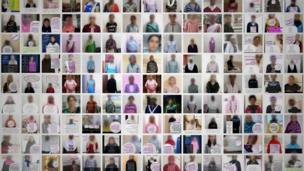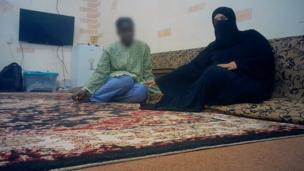Post by Tukuler al~Takruri on Nov 5, 2019 16:31:43 GMT -5
Surely, we thought while growing up in the 60's and 70's, the world will progress liberally. But ah, two early metal age Homo sapiens traits ain't goin nowhere. Namely biases against the Other and slavery.
Online Horrors
Human Traffickers Are Literally Selling Slaves on Instagram
They tried to sell a 16-year-old girl on Instagram. "This is the quintessential example of modern slavery," said a UN representative.
Kristin Houser November 4th 2019
News/Human Trafficking/Instagram/Slavery
Silicon Valley is helping the global slave trade thrive — and critics argue it should be held accountable for facilitating the barbarous practice.
Posing as a husband and wife, a team from BBC News Arabic found it was disturbingly easy to discover human traffickers selling slaves online on Instagram and other popular apps.
“In the Gulf, women employed as domestic workers are being sold online via apps approved and provided by Google and Apple,” the investigators say in a video they released on Thursday. “It’s been called an online slave market.”
The investigators contacted and met with several of the people advertising domestic workers for sale online, including one in Kuwait who offered to sell them “Fatou” — a 16-year-old girl from Guinea, West Africa — for US$3,800.
“This is the quintessential example of modern slavery,” Urmila Bhoola, UN Special Rapporteur, Contemporary Forms of Slavery, told BBC News Arabic. “Here we see a child being sold and traded like chattel, like a piece of property.”
In the wake of the BBC News Arabic investigation, authorities in Kuwait have reportedly “summoned” several of the people behind the social media accounts selling slaves, according to a follow-up BBC News story published Friday.
The authorities told BBC News they also forced the account holders to take down their ads and sign a legal agreement promising to no longer “participate in this activity.”
However, the update makes no mention of any sort of punishment or legal ramifications for the sales, despite Nasser al-Mousawi, Head of Kuwait’s Domestic Workers Office, telling the BBC News Arabic team during its investigation that “anyone who deals in this type of business will be punished.”
Instagram, meanwhile, told BBC News it “had removed further content across Facebook and Instagram, and would prevent the creation of new accounts designed to be used for the online slave market.”
But Bhoola says that’s not enough.
“Google, Apple, Facebook, or any other companies [that] are hosting apps like these, they have to be held accountable,” she told BBC News Arabic. “What they are doing is promoting an online slave market.”
American international lawyer Kimberley Motley has taken on the legal case ofand she thinks the big tech companies that facilitated the slave trade should provide monetary compensation for her client.
"On [the] Apple Store, they proclaim that they are responsible for everything that’s put on their store,” Motley told BBC News. “And so our question is, what does that responsibility mean?”
Perhaps an even more important question: can Silicon Valley stop their products from being used for human trafficking in the first place?
READ MORE: Kuwait moves on Instagram slave traders after BBC investigation [BBC News]
More on slavery: AI Tool Helps Law Enforcement Find Victims of Human Trafficking
futurism.com/human-traffickers-selling-slaves-instagram
Online Horrors
Human Traffickers Are Literally Selling Slaves on Instagram
They tried to sell a 16-year-old girl on Instagram. "This is the quintessential example of modern slavery," said a UN representative.
Kristin Houser November 4th 2019
News/Human Trafficking/Instagram/Slavery
Silicon Valley is helping the global slave trade thrive — and critics argue it should be held accountable for facilitating the barbarous practice.
Posing as a husband and wife, a team from BBC News Arabic found it was disturbingly easy to discover human traffickers selling slaves online on Instagram and other popular apps.
“In the Gulf, women employed as domestic workers are being sold online via apps approved and provided by Google and Apple,” the investigators say in a video they released on Thursday. “It’s been called an online slave market.”
The investigators contacted and met with several of the people advertising domestic workers for sale online, including one in Kuwait who offered to sell them “Fatou” — a 16-year-old girl from Guinea, West Africa — for US$3,800.
“This is the quintessential example of modern slavery,” Urmila Bhoola, UN Special Rapporteur, Contemporary Forms of Slavery, told BBC News Arabic. “Here we see a child being sold and traded like chattel, like a piece of property.”
In the wake of the BBC News Arabic investigation, authorities in Kuwait have reportedly “summoned” several of the people behind the social media accounts selling slaves, according to a follow-up BBC News story published Friday.
The authorities told BBC News they also forced the account holders to take down their ads and sign a legal agreement promising to no longer “participate in this activity.”
However, the update makes no mention of any sort of punishment or legal ramifications for the sales, despite Nasser al-Mousawi, Head of Kuwait’s Domestic Workers Office, telling the BBC News Arabic team during its investigation that “anyone who deals in this type of business will be punished.”
Instagram, meanwhile, told BBC News it “had removed further content across Facebook and Instagram, and would prevent the creation of new accounts designed to be used for the online slave market.”
But Bhoola says that’s not enough.
“Google, Apple, Facebook, or any other companies [that] are hosting apps like these, they have to be held accountable,” she told BBC News Arabic. “What they are doing is promoting an online slave market.”
American international lawyer Kimberley Motley has taken on the legal case of
Fatou — whom authorities located following the investigation and deported home to Guinea where a local family adopted her—
"On [the] Apple Store, they proclaim that they are responsible for everything that’s put on their store,” Motley told BBC News. “And so our question is, what does that responsibility mean?”
Perhaps an even more important question: can Silicon Valley stop their products from being used for human trafficking in the first place?
READ MORE: Kuwait moves on Instagram slave traders after BBC investigation [BBC News]
More on slavery: AI Tool Helps Law Enforcement Find Victims of Human Trafficking
futurism.com/human-traffickers-selling-slaves-instagram





